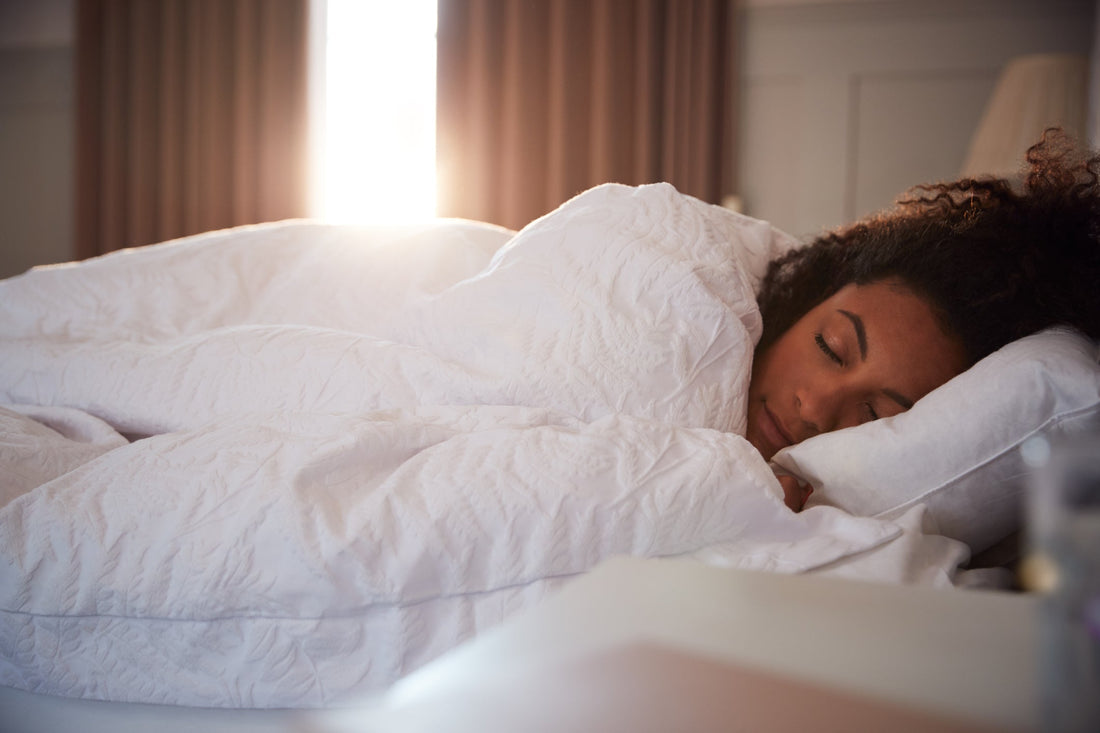Read Time: 5 min | Categories: Mental Health and Sleep
5 Tips to Get a Better Night’s Sleep
Webber Naturals
Share this article
If you find yourself tossing and turning at night, and having difficulty getting a good night’s rest, you’re not alone. Approximately 30% of Canadians are sleep deprived, sleeping less than seven hours a night, even though experts recommend 7–9 hours. Short sleep duration and poor sleep quality are common among Canadians.[1] If you’re one of these Canadians, you are not alone!
The good news is that you can do many things to improve your quality of sleep.
The Benefits of Sleep
First off, why is sleep so important? Well, sleep contributes to the normal function of your brain and body. Your body needs sleep to recover from the day’s physical, emotional, and mental activities. While you sleep, your body repairs damaged cells and recharges your nervous system.
There’s also truth to the phrase “beauty sleep” – while you sleep, your body replenishes your cells, which is key to maintaining healthy skin and bodily functions as you age.
Getting a good night’s rest helps your overall well-being and makes you feel more energized throughout the day. Keep reading to uncover key strategies for improving your sleep.
Table of Contents
- Have a bedtime snack
- Keep your internal clock consistent
- Practice good sleep hygiene
- Listen to something to lull yourself to sleep
- Turn to a trusted supplement
How to Fall Asleep More Easily
Falling asleep isn’t an easy feat for everyone. Luckily there are some simple steps you can take to help you fall asleep faster and have better quality sleep.
1. Have a bedtime snack
Eating a light, healthy snack about 90 minutes before bedtime can help prevent sleep disturbances caused by low blood sugar. Snacks should include protein, fibre, complex carbs, and minerals. Nourishing foods and ingredients that we suggest for evening snacks include:
- Almonds
- Bananas
- Cherry juice
- Dark chocolate
- Herbal tea
- Honey
- Kale
- Turkey
- Walnuts
- Warm milk
- Whole grains

There are also a few snacks and herbal teas that are suitable to enjoy closer to bedtime. Snacks could include half a cup of low-fat cottage cheese with an apple, half an avocado on a slice of whole-grain toast, a handful of raw nuts or seeds, or a small bowl of cherries. Herbal teas made with chamomile, passionflower, valerian root, hops, or relaxing blends of these non-caffeinated herbs are great choices.
2. Keep your internal clock consistent
Sticking to the same bedtime and wake-up time (yes, even on weekends!) helps maintain your normal circadian rhythm (the natural process in your body that regulates when you wake up and go to sleep). Allowing your body to maintain its internal clock naturally improves sleep quality. Here are some ways to ensure your body keeps its internal clock consistent:
- Wake up at the same time every day.
- Try to get some natural sunlight. Even just a few minutes outdoors can improve your mood, and fresh air has been shown to promote better sleep.
- Reduce your caffeine intake and avoid drinking it in the afternoon to decrease its chances of disrupting your sleep at night.
- When going to bed, keep your bedroom as dark as possible to help your body produce melatonin, the natural hormone that regulates your circadian rhythm.
- Try to go to bed at the same time every night.
3. Practice good sleep hygiene
Good sleep hygiene means you’ve implemented daily habits, and created a positive environment and a bedtime routine that set you up for a good night’s rest.
- Create an environment that promotes sleep. We’ve included a handy checklist below that can help you get started. For more ways to optimize your environment, check out our blog on 5 Ways to Create Your Own Sleep Sanctuary.
- Make your bedroom as comfortable as possible. This includes ensuring your mattress, pillows, and bedding suit your needs and preferences.
- Ensure that your room is at a cool, comfortable temperature.
- Minimize light by using blackout curtains or a sleep mask.
- Use your senses to help you wind down. Scents such as lavender promote a sense of calm and relaxation, and listening to music can also help you drift off to sleep.
- Try not to use devices such as your phone, laptop, or tablet before bed. The blue light emitted from the screens can disrupt the production of melatonin, which is needed to help you fall asleep. However, if you need to use electronics before bed, switching the device setting to night mode or using blue light filtering software can help reduce the amount of blue light emitted from the screen.
- Doing activities that help you relax as part of your bedtime routine can improve your sleep. This can include taking a bath, washing your face and applying your nighttime skin care, writing in your journal, reading a book, or listening to relaxing music. Experiment to find out which activities work best for you!

4. Listen to something to lull yourself to sleep
Whether it’s white noise, a deep breathing exercise, or a bedtime story, sounds can help you drift off easier. This is the one instance in which we encourage you to use your smartphone before bed – you can turn off the screen while still listening to something that can promote the zzzs. There are many apps that do this, such as Headspace or Calm.
If you want to keep your smartphone away from your bed as recommended by sleep experts, you can also try sound machines that play white noise.

5. Turn to a trusted supplement
If your sleep pattern is thrown off by jet lag, stress, an irregular schedule, a sleep disorder, or age-related factors, a melatonin supplement can help you get back on track. Melatonin helps you fall asleep quickly, stay asleep longer, and improve sleep quality. In a research study, melatonin was also shown to have positive effects on primary sleep disorders.[2] These include restless leg syndrome, snoring, shortness of breath, sleep apnea, and narcolepsy.[3]

Need help choosing a sleep supplement? Find out more here.
